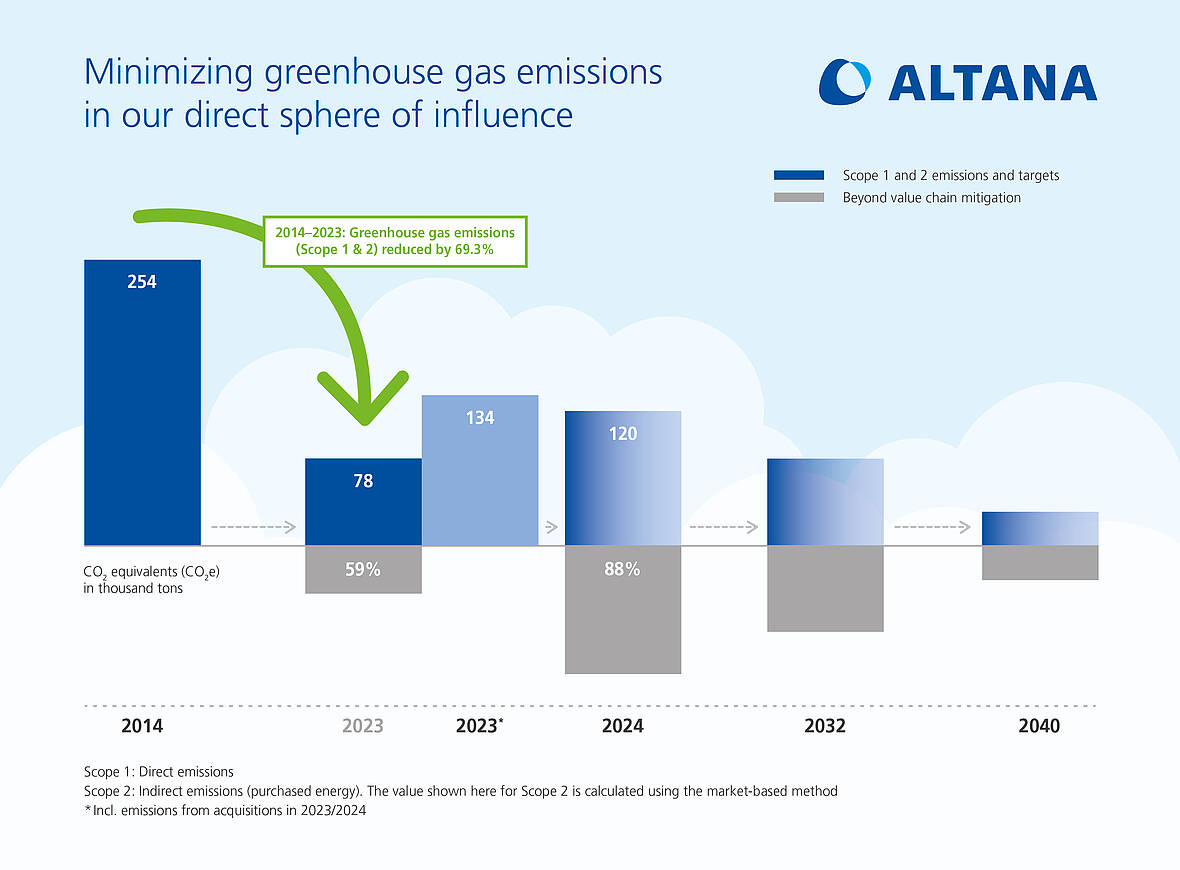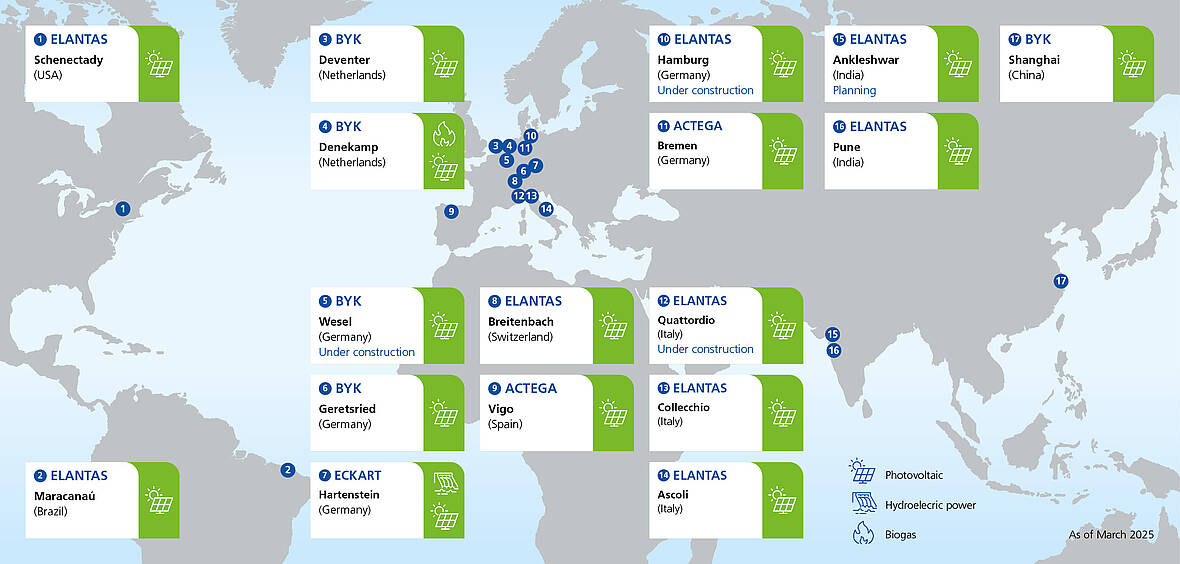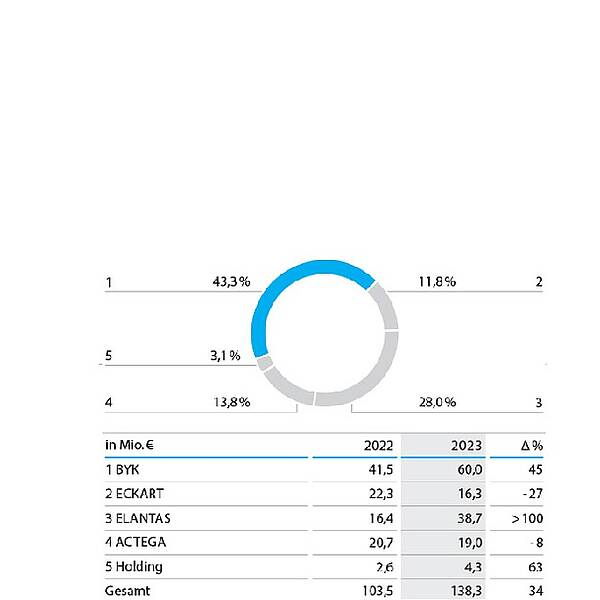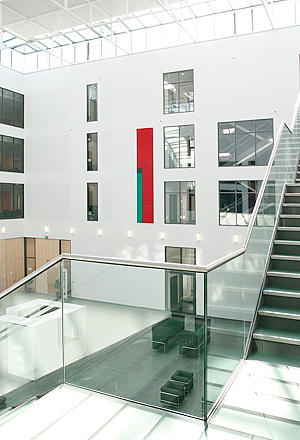Consistent climate strategy
Our primary focus for enhancing sustainability lies in making our own products and those of our customers more sustainable, a commitment we uphold daily. Concurrently, we are steadfast in our pursuit of becoming nearly greenhouse gas-free across all three scopes. ALTANA is on the right track: Between 2014 and 2023, we already achieved a substantial reduction of approximately 70 percent in greenhouse gas emissions within Scopes 1 and 2 – without relying on offsetting.
December 2015, Paris: At the UN Climate Change Conference, 195 countries agreed to limit the increase in the global average temperature to well below two degrees Celsius. The aim is to reduce the harm done to people and the environment. We can only reach this goal together. To achieve this objective, we all have to make a contribution. ALTANA implements a diverse array of measures aimed at reducing greenhouse gas emissions.
To reduce greenhouse gas emissions, ALTANA is focusing on improving its energy efficiency and on new technologies. To this end, the company regularly reviews its operating processes, plants, and machinery in order to identify and implement CO2 savings potential. One example is the optimization of thermal afterburning at its home site in Wesel. There, the BYK division has reduced greenhouse gas emissions by 400 tons of CO2 equivalents by increasing the efficiency of heat generation from 85 to 95 percent. You can read about more projects in the “Environment” chapter of our Corporate Report.
Own electricity generation from renewable sources
Whether solar or hydropower, ALTANA has been purchasing electricity from renewable sources since March 2020. In addition, the ALTANA Group relies on its own generation of electricity from renewable energy sources. In addition to the solar plants at ELANTAS in Ascoli Piceno and Collecchio in Italy, and at BYK in Deventer in the Netherlands, ACTEGA, for example, operates a photovoltaic plant at the Spanish site in Vigo. The solar plant at ELANTAS in Pune, India, even meets the electricity needs of the research center at this site. At BYK in Shanghai, electricity is generated from solar energy on an area of 2,000 square meters.
ECKART generates electricity from hydropower, in Hartenstein, Germany, and a biogas plant is operated at BYK in Denekamp, Netherlands. The ALTANA Group’s renewable energy generation at a glance:

ALTANA CEO Martin Babilas is playing a key role in driving the transformation. For him, industry plays a decisive role in pushing forward climate protection worldwide. He says, policymakers should create an indispensable framework for this. The climate protection targets cannot be achieved without sufficient electricity from renewable energies at competitive prices and the corresponding grid infrastructure.
“Industry plays a key role in achieving climate protection targets by driving innovation. The European Green Deal makes high demands but also offers great opportunities,” says Babilas. “Politicians must create the framework for this, for example by providing access to sufficient energy from renewable sources at competitive prices.” Furthermore, policymakers should create comparable competitive conditions for the industry with internationally uniform CO2 pricing.
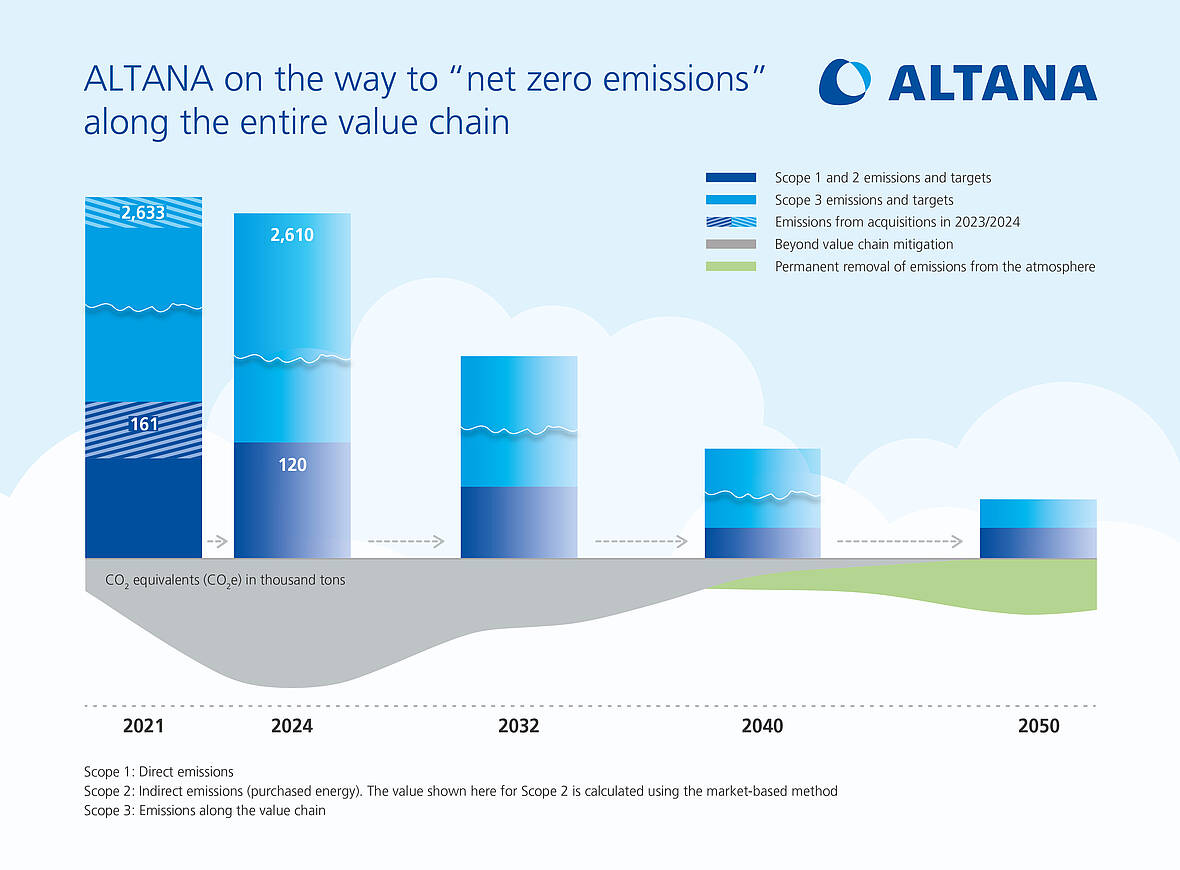
ALTANA has committed to operating virtually greenhouse gas-free worldwide by 2050 and achieving “net zero emissions”. Specifically, emissions are to be reduced by 90 percent across the entire value chain (Scope 1, 2 and 3) by then.
The internationally renowned Science Based Targets initiative (SBTi) has ALTANA's "net zero emissions" target. ALTANA underwent a process with the SBTi to have its targets independently assessed and confirmed.
Specifically, emissions along the entire value chain (Scope 1, 2 and 3) are to be reduced by 90 percent by 2050. The company will permanently remove any remaining unavoidable emissions from the atmosphere using recognized processes. Already by 2040, ALTANA aims to reduce greenhouse gas emissions within its direct sphere of influence (Scopes 1 and 2) by 90 percent.
ALTANA is building on its substantial progress in reducing greenhouse gas emissions over recent years. Between 2014 and 2023, the company successfully cut its Scope 1 and 2 emissions by approximately 70 percent. And in 2020, ALTANA transitioned its global electricity procurement entirely to renewable energy sources, among other initiatives.
Starting in 2025, ALTANA will offset its remaining greenhouse gas emissions in Scopes 1 and 2, as well as selected Scope 3 categories, by financing climate protection projects outside its value chain. This milestone signifies that the company has successfully met its current climate target.
To operate virtually greenhouse gas-free worldwide in all three scopes by 2050, ALTANA is prioritizing the electrification of processes and vehicles, the purchase of sustainable raw materials – increasingly from suppliers who have committed themselves to SBTi-approved climate targets – and the further reduction of transport routes through increased use of the company's decentralized purchasing and production network.
Conversely, ALTANA integrates sustainability objectives directly into the individual performance goals of its managers.
In implementing its climate strategy, ALTANA employs offsetting, as long as it is not yet possible to avoid virtually all greenhouse gas emissions. Starting from 2025, the company will offset all CO2 equivalents generated in Scope 1, Scope 2, and selected categories of Scope 3. This includes greenhouse gas emissions from the combustion of fossil fuels, primarily natural gas, as well as those resulting from chemical reactions in production processes (Scope 1). It also includes indirect greenhouse gas emissions from the purchase of energy, notabily electricity and steam (Scope 2).
Contact
Corporate Communications
press@altana.com
Tel +49 281 670-10900
Environment, Health & Safety
Dr. Michael Berkei
Head of Environment, Health and Safety
Michael.Berkei@altana.com
